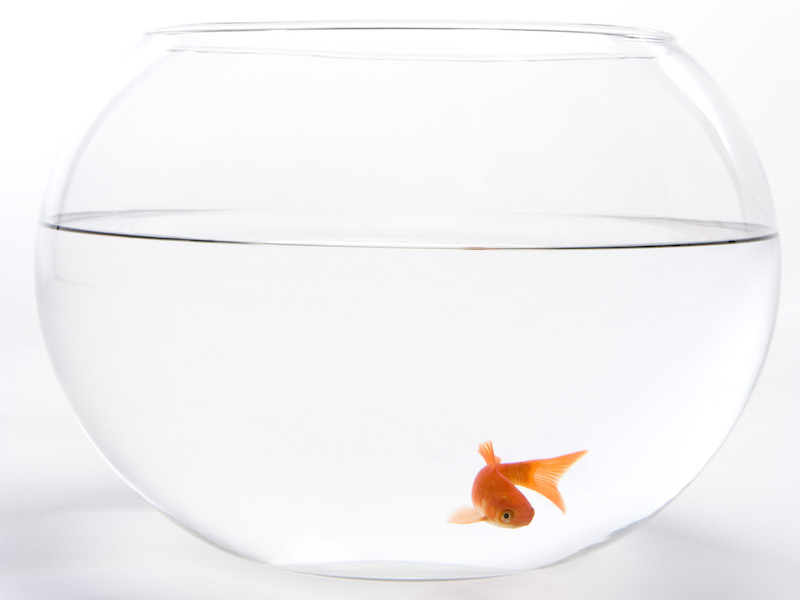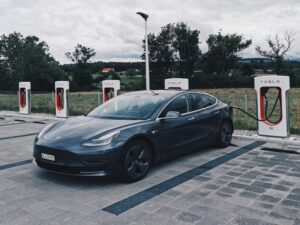Because we’re like goldfish swimming in a fishbowl
On a fine sunny morning, one fish said to the other fish, “how’s the water today?” To which the other fish replied, “what water?” A few days later, that same fish, no doubt pondering what water is, had the unfortunate fate of being caught in a net. As it was lifted away from its water world, it squirmed and spasmed, fighting to breathe as its gills depleted of oxygen. With its last breath, the fish screamed, “I need water!” The water world that makes up the reality of the fish is so all-consuming that it’s as if water doesn’t exist. Only when the fish is removed from its all-consuming reality that it recognises the truth staring it in the face.
The metaphor is just as relevant for us living in society as it is for the fish living in the ocean. The world around us is an all-consuming reality, so much so that we fail to recognise that the conditions we depend on for our existence depends on a climatic balance being maintained. If that balance is broken, it would be akin to the fish being plucked out of its water world.
The difference between fish and humans is that we have foresight. We know that post-industrial societies and the lifestyles accompanying them require massive energy inputs. We also know that eighty per cent of our energy needs still comes from fossil fuels. We know that burning fossil fuels releases greenhouse gases into the atmosphere. We also know that increasing the concentration of greenhouse gases in the atmosphere leads to global warming. We know that if we continue to emit greenhouse gases, it will lead to a terrible future where social collapse and untold suffering will become a distinct possibility. We know all of this, and yet while countless companies and individuals are driven to transform society onto a sustainable path, we remain locked on the same course — emissions continue to increase, and with it, so does the risk of triggering radical changes to the natural world.
Why though? Why do emissions continue to increase at a time when they need to dramatically decrease?
A major reason is due to the fishbowl that creates our reality. When we’re born, we’re not part of any society. We’re born with a natural capacity to be socialised. The process of socialisation means we come to see the world around us as an unquestioned reality, the only way the world could possibly be. Key to the process of socialisation is that we subconsciously learn a set of beliefs that form the building blocks of our reality. These beliefs are the pillars the social construct rests upon. Just like the fish in water, they are all-encompassing and create a truth about the way we see the world. So much so that it’s not necessary to understand these beliefs; you need only to understand how to conform to them. These beliefs translate into the norms, values and conventions that drive human behaviour.
We are all a product of beliefs, traditions, norms, and values that amalgamate to form a way of doing things — the rules of the game that comprise society. The rules of the game are interconnected with emissions increasing. Take consumption. We’re raised to believe that social success hinges on having more stuff and money than everyone else. Each person is taught to lead a materialistic lifestyle. The thing about consumption is that every single thing we consume has a carbon footprint.
The thing is, every decision made by every individual is made in isolation. But the accumulative effect of billions of individual choices has led (and continues to lead) to terrible outcomes. And so, individuals can’t be blamed for driving emissions upwards. Our social and economic goals are all wrong. How we organise the economy means more emissions are an inevitable outcome because the economy’s health hinges on economic growth. Economic growth requires ever-increasing production and consumption. Do you see the tension at the heart of creating a sustainable society?
Rather than question the fishbowl that makes up our reality, most sustainability practitioners focus on making slight adjustments to the fishbowl. But seeing as the fishbowl is unsustainable by design, what’s required is a redesign of the fishbowl that makes up our reality. Here’s another point of tension. Plenty of powerful vested interests have no desire to change the fishbowl because that would require them to give up their power and influence. And the thing is, we all have something to lose should society transform. We have all been brought up in the world as it is; the rules that maintain society bring consistency to our daily lives.
But we’ve now reached a point where the changes we’ve made to the natural world are so profound that transformation has become inevitable. We’re either proactive in instigating social transformation and creating sustainable societies that allow us to adapt to a changing environment. Or, the environment will change, and we’ll be forced to deal with crisis after crisis as societies are ill-equipped to deal with the challenges being faced. Seeing as we’re trapped within a fishbowl that compels certain behaviour, it seems the only way the need for transformation will be recognised is when we’re forced to transform. By that point, we’ll be like the fish squirming and squealing for breath as it hangs on for dear life.



